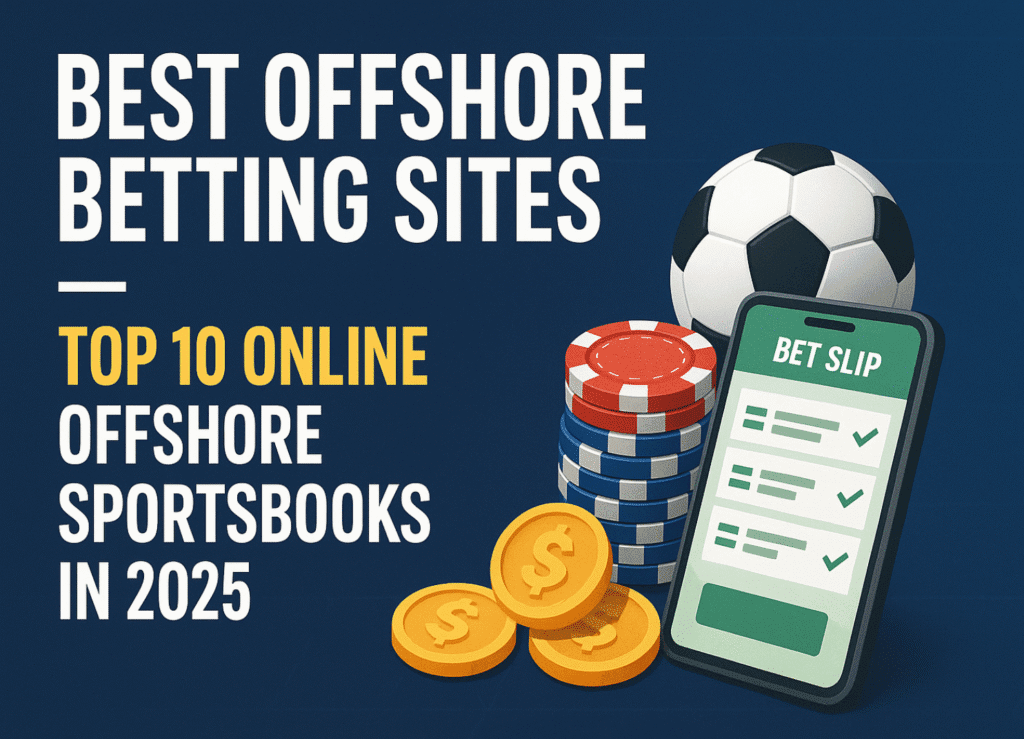The global sports betting industry is growing at an incredible pace, and offshore sportsbooks play a huge role in this expansion. With millions of bettors searching for alternatives to local betting platforms, offshore betting sites have become a gateway to broader markets, more bonuses, and flexible banking options.
In this detailed guide, we will break down everything you need to know about offshore sportsbooks in 2025: what they are, how they operate, whether they are legal, and how to choose the safest sites for your wagers.

What Exactly Are Offshore Sportsbooks?
An offshore sportsbook is an online betting platform that operates outside of a bettor’s home jurisdiction. For example, many of these sites are licensed in countries like:
- Curacao
- Costa Rica
- Panama
- Antigua and Barbuda
Since they are located offshore, they are not bound by strict U.S. or European gambling laws. This allows them to offer a much wider selection of sports, odds, and promotions compared to many local bookmakers.
Key Features of Offshore Betting Sites
- Operate in international jurisdictions.
- Serve players in multiple countries without restrictions.
- Often accept cryptocurrencies and e-wallets.
- Provide larger bonuses compared to local betting apps.
Why Bettors Turn to Offshore Sportsbooks
The rise of offshore sportsbooks is not a coincidence. Players are constantly looking for more freedom and flexibility when it comes to sports betting.
Here are the main reasons bettors prefer offshore operators:
- Access to Global Sports Markets – Unlike local sites, offshore sportsbooks allow you to bet on everything from U.S. college football to European handball.
- Bigger Welcome Bonuses – These platforms compete for international players, so they often provide massive deposit matches and free bets.
- Crypto-Friendly Options – Many offshore sportsbooks accept Bitcoin, Ethereum, and USDT, making deposits and withdrawals faster and cheaper.
- Worldwide Availability – You can register and bet regardless of where you are, without worrying about local restrictions.
- Live Betting & Casino Games – Offshore sites usually combine sports betting with live casinos, poker rooms, and esports betting.
Are Offshore Sportsbooks Legal in 2025?
One of the most common questions is about legality. The answer depends on where you live:
United States – Offshore sportsbooks are not licensed by U.S. authorities. However, placing a bet as a player is not considered a crime, meaning millions of Americans still use them.
Brazil – Offshore sportsbooks operate in a gray area but remain extremely popular. With sports betting regulations still in development, players continue to use international platforms.
Europe – Many European countries only allow locally licensed bookmakers, but players can still access offshore sites without facing penalties.
In summary: using offshore sportsbooks is rarely illegal for players. The real issue is that these platforms are not regulated by your local government, meaning there is less legal protection if disputes arise.
Benefits of Offshore Betting Sites
Choosing an offshore sportsbook can be advantageous, especially if you are seeking flexibility.
Variety of Sports and Markets
You’ll find odds on major leagues like the NFL, NBA, Premier League, La Liga, and UFC, plus niche sports such as darts, snooker, and even esports.
Higher Payouts and Bonuses
Offshore sportsbooks compete globally, so they often provide:
- 100% deposit match bonuses.
- Free bet credits.
- Reload promotions.
- VIP rewards.
More Banking Options
Unlike local sportsbooks, offshore platforms accept:
- Credit/debit cards.
- E-wallets (PayPal, Skrill, Neteller).
- Cryptocurrencies.
- Bank transfers.
Accessibility
No matter your location, you can usually sign up and place bets within minutes.
Risks of Offshore Sportsbooks
While offshore sportsbooks provide many benefits, they also come with serious risks.
❌ Lack of local regulation – If you have issues with payments, local authorities may not be able to help.
❌ Withdrawal delays – Some sites take days or weeks to process payouts.
❌ Unreliable operators – Not every offshore sportsbook is trustworthy. Some are scams.
❌ Limited customer support – In many cases, support is only available in English and may not operate 24/7.
How to Choose a Safe Offshore Sportsbook
If you decide to bet offshore, you should follow strict guidelines to protect yourself.
- Check Years of Operation – Older sportsbooks are usually more trustworthy.
- Check Licensing – Look for a license from Curacao, Isle of Man, or Malta.
- Read Reviews – Search for user feedback and check payout reliability.
- Verify Payment Methods – Choose sportsbooks that support fast withdrawals and cryptocurrencies.
- Look for Security – Ensure the site uses SSL encryption to protect your data
Offshore Sportsbooks vs. Local Bookmakers
| Feature | Offshore Sportsbooks | Local Sportsbooks |
|---|---|---|
| Market Coverage | International | National/Regional |
| Bonuses & Promotions | High | Moderate |
| Banking Options | Crypto + E-wallets | Limited |
| Regulation & Protection | Limited | Strong |
| Availability | Worldwide | Restricted |
The Future of Offshore Betting Sites in 2025 and Beyond
As sports betting continues to expand globally, offshore sportsbooks will likely remain key players in the market. With cryptocurrencies becoming mainstream and bettors demanding more competitive odds, these platforms will keep attracting international users.
However, governments worldwide are moving toward stricter regulations. Countries like Brazil and the U.S. are working on frameworks that could reduce the dominance of offshore operators in the future.
FAQs About Offshore Sportsbooks
1. Are offshore sportsbooks safe?
Some are, but not all. Always choose a licensed and well-reviewed site.
2. Can I use offshore sportsbooks in the U.S.?
Yes, millions of Americans do. However, these sites are not regulated by U.S. laws.
3. Do offshore sportsbooks pay out winnings?
The best ones do. Stick to platforms with strong reputations for reliability.
4. What payment methods do offshore sportsbooks accept?
Most support credit cards, e-wallets, and cryptocurrencies like Bitcoin.
5. Is betting with offshore sportsbooks legal?
In most cases, players are not breaking any laws, but the sites themselves operate in a legal gray area.
Final Verdict – Should You Use Offshore Sportsbooks?
Offshore sportsbooks in 2025 remain a strong alternative to local bookmakers, offering:
- Broader betting markets.
- Larger bonuses.
- Crypto-friendly payments.
- Worldwide accessibility.
At the same time, players must be cautious. Since these platforms are not locally regulated, you need to choose trusted and licensed offshore sportsbooks to ensure a safe experience.
If you want more variety, bigger rewards, and access to global betting opportunities, offshore sportsbooks can be a great choice – as long as you play smart and stick to reputable operators.








